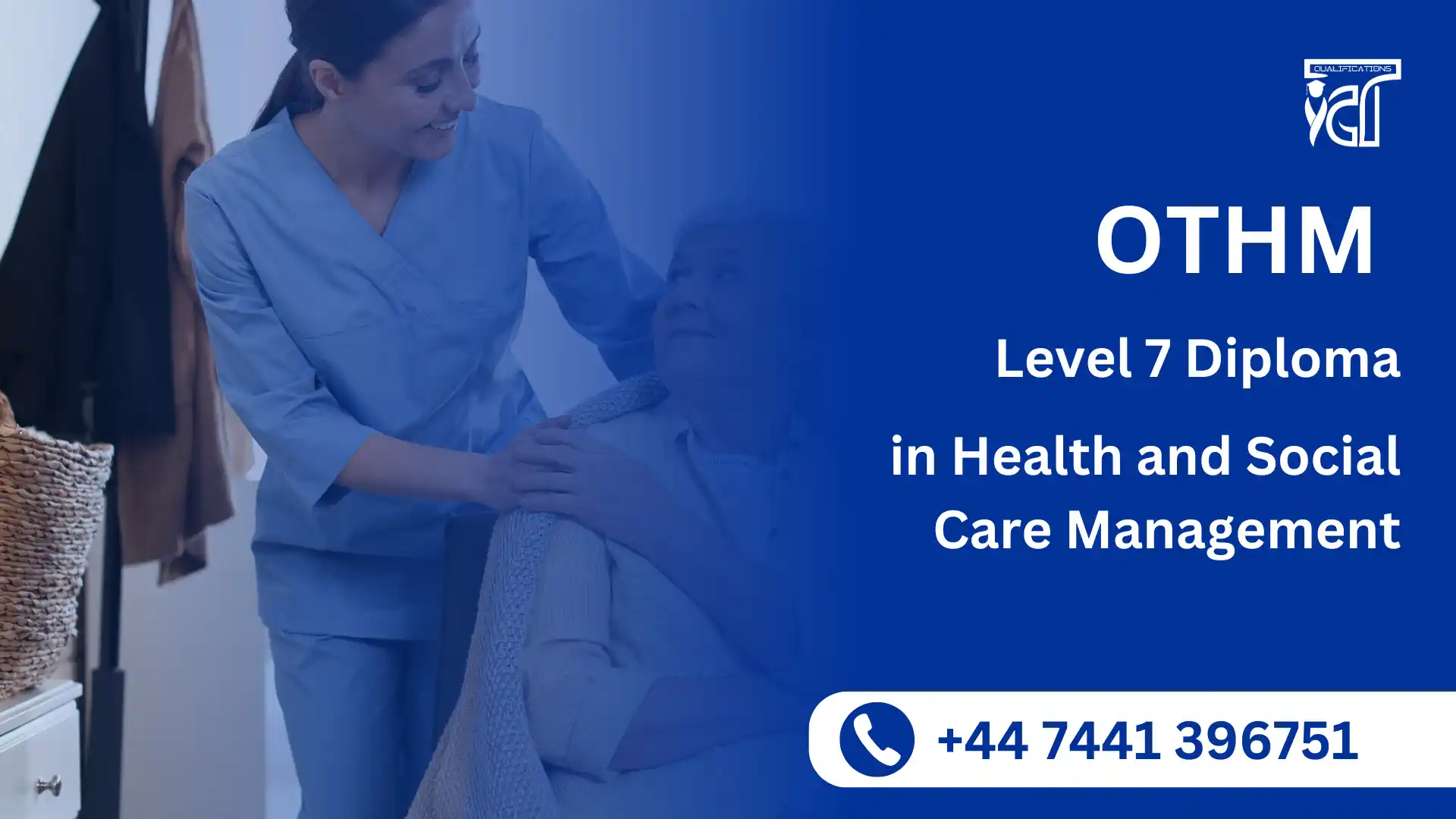The OTHM Level 7 Diploma in Health and Social Care Management stands as a recognized and valuable qualification for those looking to advance their careers in the healthcare sector. This OFQUAL regulated qualification offers an opportunity for learners to develop essential managerial skills while focusing on the dynamic landscape of health and social care services.
The OTHM Level 7 Diploma in Health and Social Care Management is an advanced qualification aimed at professionals who aspire to lead and manage healthcare services, with a focus on both practical and theoretical aspects. This diploma is specifically designed to help individuals enhance their leadership capabilities, manage complex health and social care systems, and ensure the delivery of high-quality services.
The qualification is regulated by the Office of Qualifications and Examinations Regulation (OFQUAL), meaning it meets the stringent standards set by the UK government to ensure quality, consistency, and relevance in the healthcare sector.
The OTHM Level 7 Diploma in Health and Social Care Management is an ideal qualification for individuals seeking to take on senior leadership roles within the health and social care sector. Its OFQUAL regulated status, assignment-based assessment, and comprehensive curriculum ensure that it delivers the knowledge, skills, and practical experience required to excel in this challenging and rewarding field.
OTHM Level 7 Diploma in Health and Social Care Management
The OTHM Level 7 Diploma in Health and Social Care Management comprises 6 mandatory units, offering a total of 120 credits. The qualification requires 1200 hours of Total Qualification Time (TQT) and 600 Guided Learning Hours (GLH) to complete.
| Sr# | Unit Title | Credits | GLH |
|---|---|---|---|
| 1 | Health and Social Care Leadership | 20 | 100 |
| 2 | Managing People in Health and Social Care | 20 | 100 |
| 3 | Managing Finance in Health and Social Care | 20 | 100 |
| 4 | Health and Social Care Strategies and Policies | 20 | 100 |
| 5 | Leading Change in Health and Social Care | 20 | 100 |
| 6 | Research Methods for Healthcare Professionals | 20 | 100 |
GLH (Guided Learning Hours) and TQT (Total Qualification Time) are terms commonly used in vocational qualifications to help define the amount of time a learner is expected to spend on heir studies.
1. GLH (Guided Learning Hours)
GLH refers to the number of hours a learner spends being directly taught, supervised, or supported during their course. This includes the time spent in activities such as:
- Classroom instruction
- Practical workshops
- One-on-one tutoring or mentoring sessions
- Online learning sessions with tutor support
In other words, GLH represents the time that learners are actively engaged with their instructors or learning activities.
2. TQT (Total Qualification Time)
TQT represents the total amount of time a learner is expected to invest in completing a qualification, including:
- GLH (Guided Learning Hours): Time spent on direct learning, as explained above.
- Self-Directed Learning: This includes time spent on independent study, research, assignment completion, preparation for exams, and any other work the learner does outside of direct teaching hours.
TQT is a broader measure that includes all the time required to achieve the qualification. It helps learners and employers understand the overall commitment required for the qualification.
Key Differences Between GLH and TQT:
- GLH focuses on direct learning with guidance or supervision.
- TQT includes GLH as well as independent study time and other learning-related activities.
Example:
If a qualification has a TQT of 600 hours and a GLH of 250 hours, it means the learner should spend 250 hours in direct learning (classroom, online, or tutor-led sessions) and 350 hours on independent study or research.
Learning Outcomes of OTHM Level 7 Diploma in Health and Social Care Management
Health and Social Care Leadership
- Understand theories of leadership utilised in health and social care settings.
- Understand influences on motivation and performance in the health and social care sector.
- Understand the features of effective team performance within the health and social care sector.
Managing People in Health and Social Care
- Understand recruitment and selection processes in health and social care.
- Understand training and career development opportunities available for individuals.
- Understand performance management in health and social care.
- Understand strategies for managing a diverse workforce
Managing Finance in the Health and Social Care Sector
- Understand the role of financial information in managing health and social care organisations
- Understand the different sources of finance available for the health and social care organisations
- Understand how business decisions in health and social care can be informed by financial information.
Health and Social Care Strategies and Policies
- Understand the development of international healthcare policy
- Understand external and internal environments for health and social care organisations.
- Understand strategic and business plans for health care organisations based on environmental analysis.
- Understand the contribution of public and health promotion in the provision of health and social care services.
Leading Change in Health and Social Care
- Understand perspectives of quality in health and social care services.
- Understand strategies for achieving quality in health and social care services.
- Understand the principles of change management in health and social care settings.
- Be able to create a plan and implement effective change within a health and social care organisation.
- . Be able to analyse stakeholder responses to organisational change.
Research Methods for Healthcare Professionals
- Understand the relevance of research within health and social care contexts.
- Understand research approaches in health care contexts.
- Be able to plan a research proposal relevant to management of health and social care contexts
- Be able to analyse and interpret a range of data.
- Understand the relationship between research and evidence based practice.
- Advanced Career Opportunities
The OTHM Level 7 Diploma equips you with the advanced knowledge and skills required to take on senior leadership roles within the health and social care sector. It opens doors to career advancement, including positions like healthcare managers, directors, and leaders of large care organizations. - OFQUAL Regulated and Globally Recognized
As an OFQUAL regulated qualification, the diploma meets high educational standards, ensuring it is recognized by employers and institutions both within the UK and internationally. This recognition boosts your professional credibility and career prospects. - Assignment-Based Assessment
The course is entirely assessment-based, eliminating the need for exams. This flexible approach allows you to focus on real-world applications, enhancing your learning experience. You will complete assignments that demonstrate your ability to solve practical challenges in health and social care management. - Develop Key Management Skills
The diploma focuses on critical managerial competencies such as strategic leadership, organizational development, quality assurance, and service improvement. These skills are essential for managing health and social care services effectively, ensuring better outcomes for patients and service users. - Flexible Learning Pace
The qualification is designed to fit into the schedules of busy professionals. You can complete the course at your own pace, allowing you to balance work, personal life, and studies. This flexibility makes it ideal for those already working in the health and social care sector. - In-Depth Understanding of Policy and Strategy
The course provides a thorough understanding of health and social care policies and strategies. You will learn how to interpret and implement policies in your organization, ensuring compliance and alignment with national and international standards. - Hands-On Knowledge for Real-World Impact
The course is designed to equip you with practical, real-world knowledge. You will gain insights into managing health and social care services, improving patient care, and enhancing operational performance within your organization, giving you the tools to make a direct impact on service delivery. - Pathway to Further Education
The OTHM Level 7 Diploma can serve as a stepping stone for further academic progression. It provides a foundation for pursuing master’s degrees or other advanced qualifications in health and social care management, supporting long-term career development. - Increase Professional Competence
By completing the qualification, you will be better equipped to navigate the complexities of the health and social care industry. The diploma enhances your decision-making, problem-solving, and leadership capabilities, increasing your professional competence and confidence. - Build a Network of Professionals
During the course, you will connect with like-minded professionals from diverse backgrounds within the health and social care sector. This network can provide valuable insights, collaborations, and career opportunities as you advance in your career.
By earning the OTHM Level 7 Diploma in Health and Social Care Management, you are investing in both your personal growth and the future success of your organization.
The OTHM Level 7 Diploma in Health and Social Care Management is designed for experienced professionals who are looking to further develop their leadership and management skills within the health and social care sector. The ideal learner for this qualification is someone who:
- Has Experience in the Health and Social Care Sector
The ideal candidate should have a background in health and social care, with practical experience in roles such as care managers, team leaders, or supervisors. This qualification is aimed at professionals who are already working in healthcare settings and wish to move into more senior leadership and management roles. - Aspires to Take on Senior Management or Leadership Roles
The diploma is perfect for individuals who aim to progress to higher managerial or strategic roles within their organization. Those who wish to become healthcare directors, department heads, or managers of larger healthcare facilities will greatly benefit from the skills and knowledge gained through the course. - Seeks to Develop Advanced Leadership Skills
The course is suited for learners who are eager to enhance their leadership abilities, including strategic planning, organizational development, and managing complex healthcare systems. Individuals seeking to drive change and improve service delivery in their organizations will find the qualification highly beneficial. - Is Looking for a Flexible Learning Path
The ideal learner is someone who requires flexibility in their studies. Whether balancing work commitments or other personal responsibilities, this qualification’s assignment-based assessment and self-paced learning structure make it suitable for busy professionals looking to further their education without the need for traditional exams. - Wants to Improve Service Delivery and Organizational Efficiency
Those who are passionate about improving the quality of care and the efficiency of healthcare services will benefit from this qualification. The ideal learner is someone who seeks to implement strategic changes in their organization to improve outcomes for both service users and healthcare professionals. - Is Motivated to Study Independently
Since the course is entirely assignment-based, the ideal learner should possess strong self-motivation and time management skills. Learners who are comfortable with independent study and are committed to completing assignments on their own schedule will thrive in this learning environment. - Is Interested in Further Education or Career Advancement
The OTHM Level 7 Diploma serves as a foundation for further academic progression. The ideal learner may have an interest in pursuing advanced qualifications, such as a Master’s degree, or is looking to expand their qualifications to enhance career opportunities in the healthcare sector. - Wants to Gain a Comprehensive Understanding of Health and Social Care Management
The qualification is suited for learners who want to gain a deeper understanding of the policies, strategies, and management practices that influence healthcare services. The ideal learner is someone who seeks a comprehensive and holistic approach to health and social care management, aiming to improve both their personal leadership capabilities and organizational performance.
In essence, the OTHM Level 7 Diploma in Health and Social Care Management is ideal for driven and experienced professionals who are ready to step into leadership roles and have a clear ambition to drive quality improvements in the healthcare and social care sectors.
Entry Requirements
Register Now
Qualification Process
Qualification Process for the OTHM Level 7 Diploma in Health and Social Care Management
- Self-Assessment:
Begin by evaluating your eligibility to ensure you meet the qualification requirements, including work experience, knowledge, and language proficiency. - Registration:
Complete your registration by submitting the required documents, including a scanned copy of a valid ID, and paying the registration fee. - Induction:
An assessor will conduct an induction to confirm your eligibility for the course and explain the evidence requirements. If you do not meet the criteria, your registration will be canceled, and the fee will be refunded. - Assignments & Evidence Submission:
Provide all assignments and the necessary evidence based on the assessment criteria outlined in the course. If you are unsure of the required evidence, consult with the assessor for guidance on the type and nature of evidence needed. - Feedback and Revision:
The assessor will review your submitted evidence and provide feedback. Evidence that meets the criteria will be marked as “Criteria Met,” while any gaps will be identified. You will be asked to revise and resubmit if needed. - Competence Evidence:
Submit final evidence demonstrating that all learning outcomes have been met. This evidence will be marked as “Criteria Met” by the assessor once it is satisfactory. - Internal Quality Assurance (IQA):
The Internal Quality Assurance Verifier (IQA) will review your evidence to ensure consistency, quality, and compliance with standards. - External Verification:
The IQA will submit your portfolio to OTHM External Quality Assurance Versifier (EQA) for final confirmation. The EQA may contact you directly to verify the authenticity of your evidence. - Certification:
Upon successful completion of all checks, OTHM will issue your official certificate, confirming that you have attained the OTHM Level 7 Diploma in Health and Social Care Management







